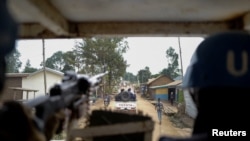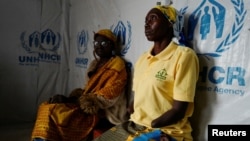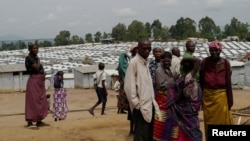Marie Dzedza has lost hope of leaving a displaced people's camp and returning to her village in the eastern Congolese province of Ituri, where rebel violence is surging while regional attention focuses on a conflict in a neighboring territory.
Five years ago, Dzedza lost both her hands in a machete attack during a raid by members of the CODECO group, one of several militias that have destabilized the densely forested province in Democratic Republic of Congo and forced 1.5 million to flee their homes since late 2017.
"We miss our old lives," she said at the Kigonze camp she shares with nearly 14,000 others, who live in rows of featureless white tents squeezed onto a clearing outside the provincial capital Bunia.
"I hate my life here ... This is why I am asking the Congolese government to do something to restore peace, so that I can return home."
The prospects are not good. Attacks have increased significantly in recent months with 419 civilians killed between Dec. 1 and mid-February, according to internal U.N. data, even as a major offensive by a different rebel group has drawn some Congolese forces away to North Kivu province to the south.
In Ituri, "what we are seeing is an upsurge," said Bintou Keita, head of the U.N.'s peacekeeping mission known as MONUSCO, which is due to pull out of Ituri and the rest of eastern Congo by 2024 according to a transition plan that is under discussion.
On an official visit to Ituri on March 1, her first in months, Keita and local authorities blamed CODECO and a rival militia called Zaire for the spiraling bloodshed and reprisal attacks.
The groups, which operate in remote areas and do not have official spokespeople, could not be reached for comment.
Looming security shortfall
In January, mass graves containing 49 bodies, including those of women and children, were discovered in two villages in Ituri, killings attributed by the U.N. to CODECO.
The insecurity has made it harder to deliver aid to those who were able to escape such attacks, worsening the humanitarian crisis, international aid groups have warned.
In mid-January, the U.N. aid agency OCHA said 12 humanitarian organizations had been forced to limit their operations in parts of Ituri because of increased attacks since the start of 2023.
Nevertheless, the steep security deterioration in Ituri has been overshadowed by the recent turbulence in North Kivu. The latter has caused greater political and diplomatic fallout with Congo, the U.N., and other nations accusing Rwanda of backing the M23 rebels there. Rwanda denies it backs the M23.
Ituri's military governor Lieutenant-General Johnny Luboya N'Kashama said the army was seeking talks with the armed groups, while also conducting large-scale patrols with MONUSCO and building new bases so it can react quicker to reports of attack.
The departure of MONUSCO has raised concerns about a looming military shortfall, but N'Kashama said the army intended to plug the gap.
"We have recruited a lot of personnel. And we believe that within three to four months, whether it's the police or the army, we will have enough to start relieving the U.N. troops," he told reporters after talks with MONUSCO's Keita.







